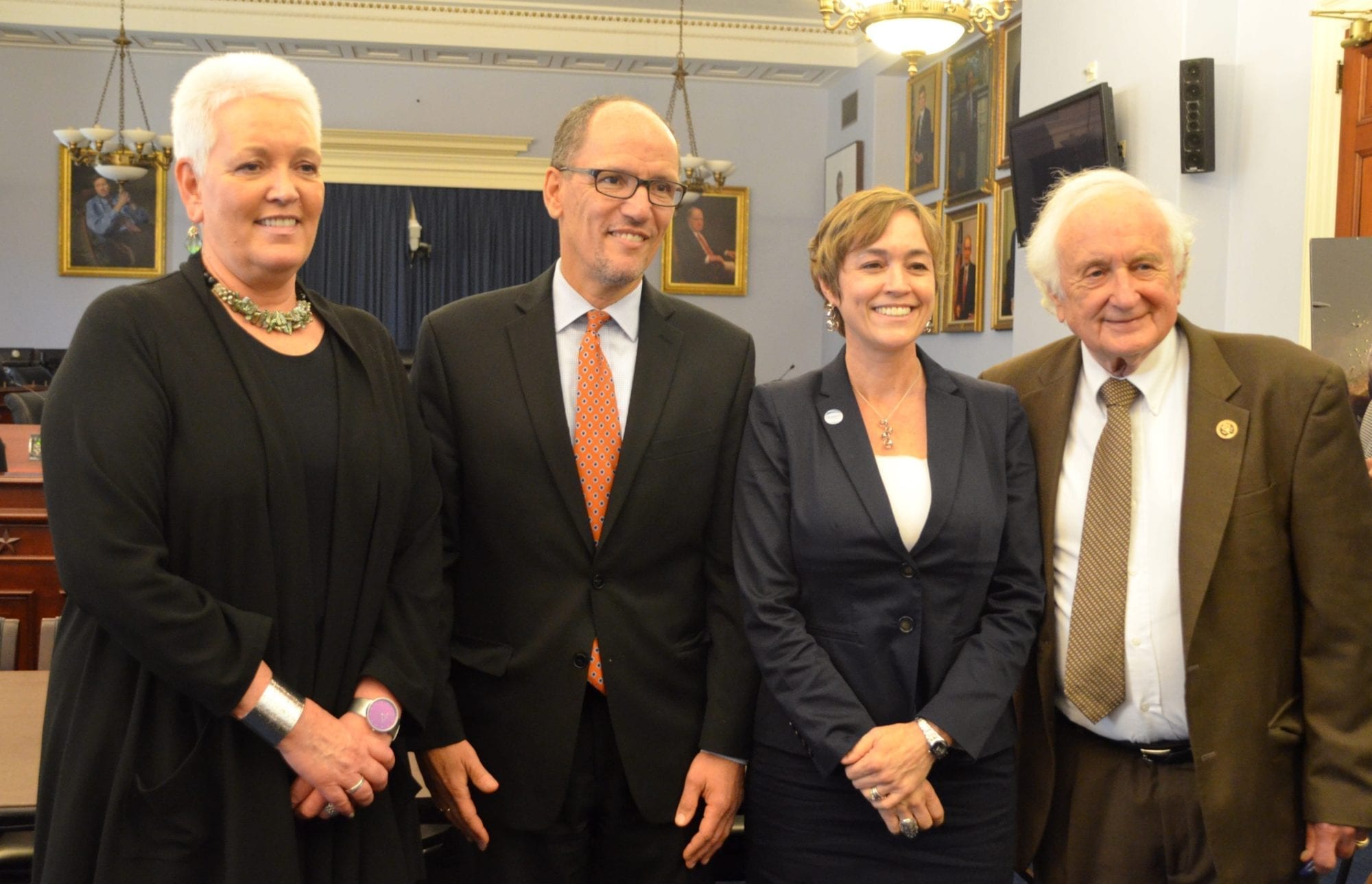
Jun 8, 2016
Dozens of congressional lawmakers, policymakers, union leaders, human rights and democracy representatives and other Solidarity Center allies gathered on Capitol Hill in Washington, D.C., yesterday to mark the launch of the Global Labor Program, a cooperative effort by the Solidarity Center and the U.S. Agency for International Development (USAID) to promote worker rights, gender equality and democracy worldwide.
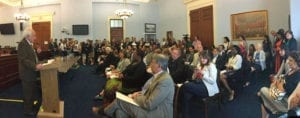
Rep. Sandy Levin spoke to a packed audience marking the launch of the Global Labor Program. Credit: Solidarity Center/Lauren Stewart
Opening the event, USAID Administrator Gayle E. Smith said, “Development cannot be sustained or inclusive without the availability of decent work. How do we reach workers? Through the Global Labor Program.”
The five-year Global Labor Program will further expand labor rights and strengthen workers’ ability to achieve decent work, lift the voices of disenfranchised workers and broaden gender equality.
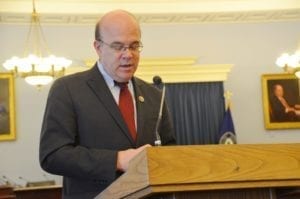
Rep. Jim McGovern: The Solidarity Center has stood by workers no matter how difficult the circumstances. Credit: Jessica Benton-Cooney/USAID
Praising the Solidarity Center for ensuring the “voiceless have a voice,” U.S. Labor Secretary Thomas Perez told the packed crowd that “the Global Labor Program is first and foremost about expanding worker voice and enabling workers to have meaningful input in the decisions that impact their lives and the lives of their families.
“When workers obtain their rights, it is almost always a step toward democracy,” said Rep. Sandy Levin (D-Mich.). Rep. Jim McGovern (D-Mass.) and Rep. Nita Lowey (D-N.Y.) also took part in opening the event.
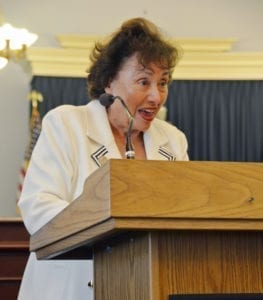
Rep. Nita Lowey: “Labor justice remains essential.” Credit: Jessica Benton-Cooney/USAID
In a letter to the gathering, Sen. Ben Cardin (D-Md.) wrote, “Solidarity Center’s ongoing work with civil society, labor unions and other governments is helping to promote both the universal values of human rights … in countries ranging from Colombia to Bangladesh.”
Following the opening remarks, moderated by David Yang, deputy assistant administrator in USAID’s Bureau for Democracy, Conflict and Humanitarian Assistance, experts from the development community took part in a panel discussion to examine the role of labor rights and civic participation in fostering more just and sustainable development.
Working People Hard-hit by Closing Civic Space
Panel moderator, Solidarity Center Executive Director Shawna Bader-Blau noted how “the effect of closing space is felt acutely by labor.”
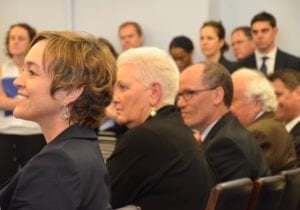
Solidarity Center Executive Director Shawna Bader-Blau, USAID Director Gayle Smith and Labor Secretary Thomas Perez at the Global Labor Program launch. Credit: Jessica Benton Cooney/USAID
“A forthcoming global survey by the International Trade Union Confederation is about to show a substantial global rise in documented attacks on worker speech and assembly rights, and specifically anti-union violence,” Bader-Blau said.
InterAction President Lindsay Coates continued the discussion on closing space for civil society, saying that “independent civil society is essential, but in country after country we see a growing crackdown on civil society space making it more difficult or even impossible for civic sector to do what it needs to do to help bring peaceful, sustainable ends to intractable crises and to advocate with governments and the private sector to push for development solutions and economic policies that really work for average people.”
Unions Needed to Secure Good Wages, Conditions for Migrant Workers
Turning the focus to labor migration, Jon Stivers, USAID assistant administrator of the Bureau for Asia, said labor and migration are crucial development issues in Asia—and unions are key to securing good wages and working conditions.
Further, “holding governments accountable is key to worker rights and open civil society,” he said.
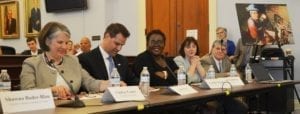
Event panelists included (from left): InterAction President Lindsay Coates, Jon Stivers, USAID; Caroline Mugalla, EATUC; Sarah Gammage, ICRW; and Rob Lederer, EICC. Credit: Jessica Benton-Cooney/USAID
Caroline Mugalla, executive secretary of the East African Trade Union Confederation (EATUC), said some 80 percent of workers across East Africa—60 percent of whom are young people—have jobs in the informal economy, meaning they generally are paid low wages, receive no sick leave, pensions or other social protections and labor in often unsafe conditions.
“If the issue of social protections is not talked about, especially for young people, we are not talking about sustainable development,” she said.
Women’s Economic Empowerment Crucial to Development
Discussing how sustainable development requires ensuring gender equality, Sarah Gammage, director of Gender, Economic Empowerment and Livelihoods at the International Center for Research on Women (ICRW), said strong unions bolster gender equality.
“Women’s economic empowerment is crucial to development, but we often neglect the connection between workers’ rights and gender rights,” she said.
Rob Lederer, executive director of the Electronic Industry Citizenship Coalition (EICC), also took part in the panel. The EICC is a nonprofit coalition of electronics companies committed to supporting the rights and well-being of workers and communities worldwide affected by the global electronics supply chain.
Closing the event, AFL-CIO Executive Vice President Tefere Gebre described the difficult conditions for workers he has witnessed first-hand in countries like Colombia and Ethiopia, saying, “worker rights are under attack in far too many countries.
“Our economies are inextricably connected, and we—as workers—are either going to be pitted against each other in a race to the bottom or we are going to be rising together creating shared prosperity for everyone.”
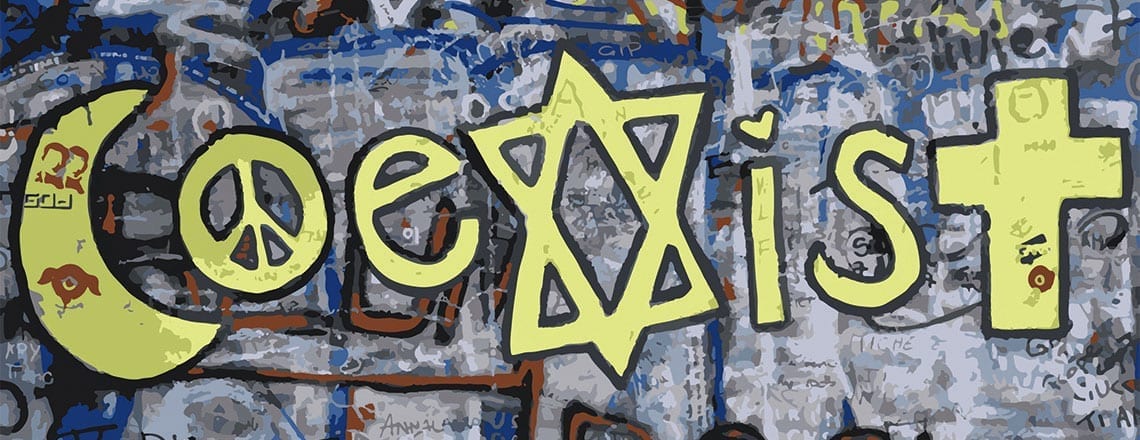
Jun 8, 2016
A new report by the United Nations (UN) Special Rapporteur for Freedom of Peaceful Assembly and of Association examines “fundamentalism in action” that is, “concrete, specific violations of the rights to freedom of peaceful assembly and of association that are motivated by these viewpoints.” The following UN article describes the report.
In recent years, there has been a perceived rise in the expression of fundamentalism in many contexts across the world. Despite the frequent use of the term, “fundamentalism” remains a word that is rarely defined with any specificity. Common use generally centers on religious fundamentalism, and this is perhaps what comes to mind first for most people.
But fundamentalism can encompass much more than religion, and in this report the Special Rapporteur takes a much broader view of the term. He believes that fundamentalism can and should be defined more expansively, to include any movements – not simply religious ones – that advocate strict and literal adherence to a set of basic beliefs or principles. Adherence to the principles of free market capitalism, for example, has spawned what has been called “market fundamentalism.” And the unbending belief in the superiority of one ethnic group, race, tribe or nationality can lead to what might be called “nationalist fundamentalism.” Numerous other examples are detailed in this report.
This report is not concerned with fundamentalist viewpoints per se, but rather with fundamentalism in action: concrete, specific violations of the rights to freedom of peaceful assembly and of association that are motivated by these viewpoints. The mere voluntary adherence to a fundamentalist belief system is not a human rights violation in and of itself. The right to hold opinions and the right to freedom of thought, conscience and religion are protected by Articles 18 and 19 International Covenant on Civil and Political Rights (ICCPR).
The danger arises when holders of these beliefs seek to impose them in a way that controls or restricts the rights of others who may have different views or backgrounds, thereby threatening the values of pluralism and broadmindedness which are core to democracy. The tipping point, for purposes of this report, is when fundamentalist views form the basis for violations of the rights to freedom of peaceful assembly and of association.
A separate section of the report examines the related, but distinct, phenomenon of extremism, and the role that assembly and association rights can play in countering its rise.
“Denying people space for peaceful, legal and constructive engagement does not make their feelings of anger, despair and dissatisfaction go away,” Kiai writes in the report. “To the contrary, it simply pushes these feelings underground, where they can fester and turn violent. Extremism thrives in such environments, because it is the only option left.”
The report (A/HRC/32/36) was released on June 7, 2016, and will be presented to the Human Rights Council during its 32nd session on June 17, 2016.
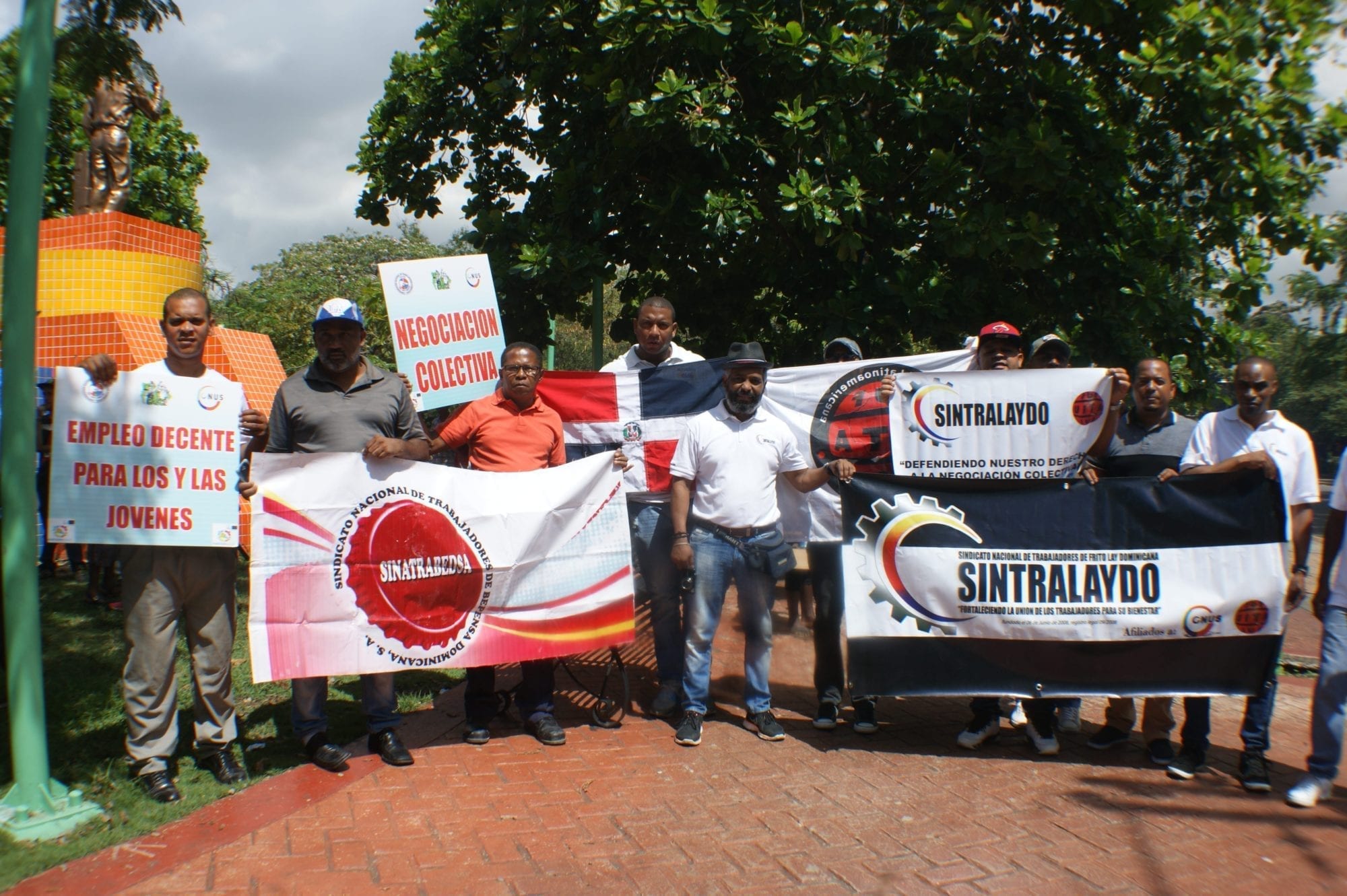
Jun 6, 2016
More than half of the workers at the eight Frito Lay worksites in the Dominican Republic who sought a voice on the job received official verification of their new union in recent days, culminating a process that began in April.
When the 621 sales, distribution and production workers joined the National Union of Workers of Dominican Frito Lay (SINTRALAYDO), their efforts were delayed by factory management, which questioned the eligibility status of dozens of workers.
Achieving union recognition by the international snack food company involved “all of the local union leaders” who “could recognize members missing from the company’s list and prove they worked there, preventing the company’s attempt to disqualify them from the count,” says SINTRALAYDO Secretary General Ramon Mosquea, a former Solidarity Center-supported labor educator.
Frito Lay Workers Persist over Years to Win Contract
The workers overcame huge obstacles to win a union. After they sought to achieve majority recognition for a union at the company in 2012, management derailed the process by presenting a list of hundreds of workers the union understood were sub-contracted, thereby reducing support for the union to less than 50 percent, according to SINTRALAYDO leaders. Dominican law requires that more than 50 percent of eligible workers support a union at a worksite before it can be officially recognized.
Since then, the company fired more than 500 SINTRALAYDO members, but workers persisted, joining with the union to recruit supporters, develop greater leadership among its executive committee and engage management in ongoing dialogue to resolve worksite problems, says Mosquea.
“As a union we need to acknowledge the importance national and international solidarity played in getting us to this stage,” he says. “I especially need to recognize the trainings, organizing support and ongoing accompaniment from the Solidarity Center. It played a fundamental role in our getting to this next stage, when we enter into collective bargaining.”
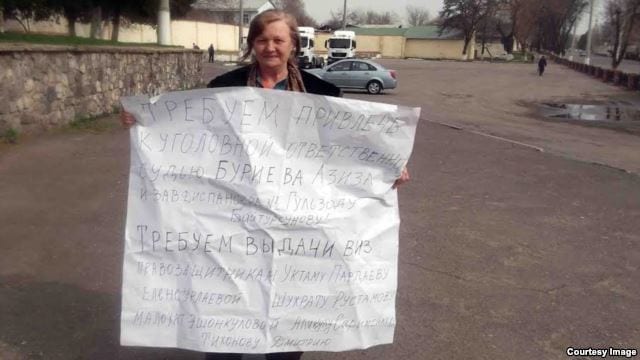
Jun 6, 2016
Uzbek human rights defender Elena Urlaeva was released last week from a psychiatric hospital in Tashkent where she was detained against her will for more than a month, according to the Cotton Campaign, a coalition of worker rights and human rights groups that includes the Solidarity Center.
While expressing relief at Urlaeva’s release, Umida Niyazova, director of the Uzbek-German Human Rights Forum says, “We continue to be alarmed at the heightened repression campaign the Uzbek government is carrying out against those who monitor forced labor in the cotton harvest.”
For 16 years, Urlaeva has documented forced labor in Uzbekistan’s cotton fields, where some 1 million teachers, medical professionals and others are forced to toil during harvest seasons. She has been credited with helping significantly reduce child labor in cotton fields, and this year was among human rights defenders in Uzbekistan to receive the International Labor Rights Forum 2016 Labor Rights Defenders Award.
Urlaeva was arrested five times last year as she spoke with those forced by the government to labor in the country’s cotton fields, and says that she was physically assaulted during the subsequent interrogation.
Uzbek Government Crackdown on Human Rights Activists
The International Labor Organization (ILO) has pushed the Uzbek government to end forced labor. Following a complaint by Uzbek civil society, the World Bank attached covenants stipulating its loans to Uzbekistan could be stopped and subject to repayment if forced or child labor was detected in project areas by ILO monitors contracted by the World Bank to carry out labor monitoring during the harvest. In March, members of the Cotton Campaign urged the World Bank to make good on its promise.
The Uzbek government has responded to global pressure to end forced labor by cracking down on Uzbek labor rights activists who monitor cotton harvests.
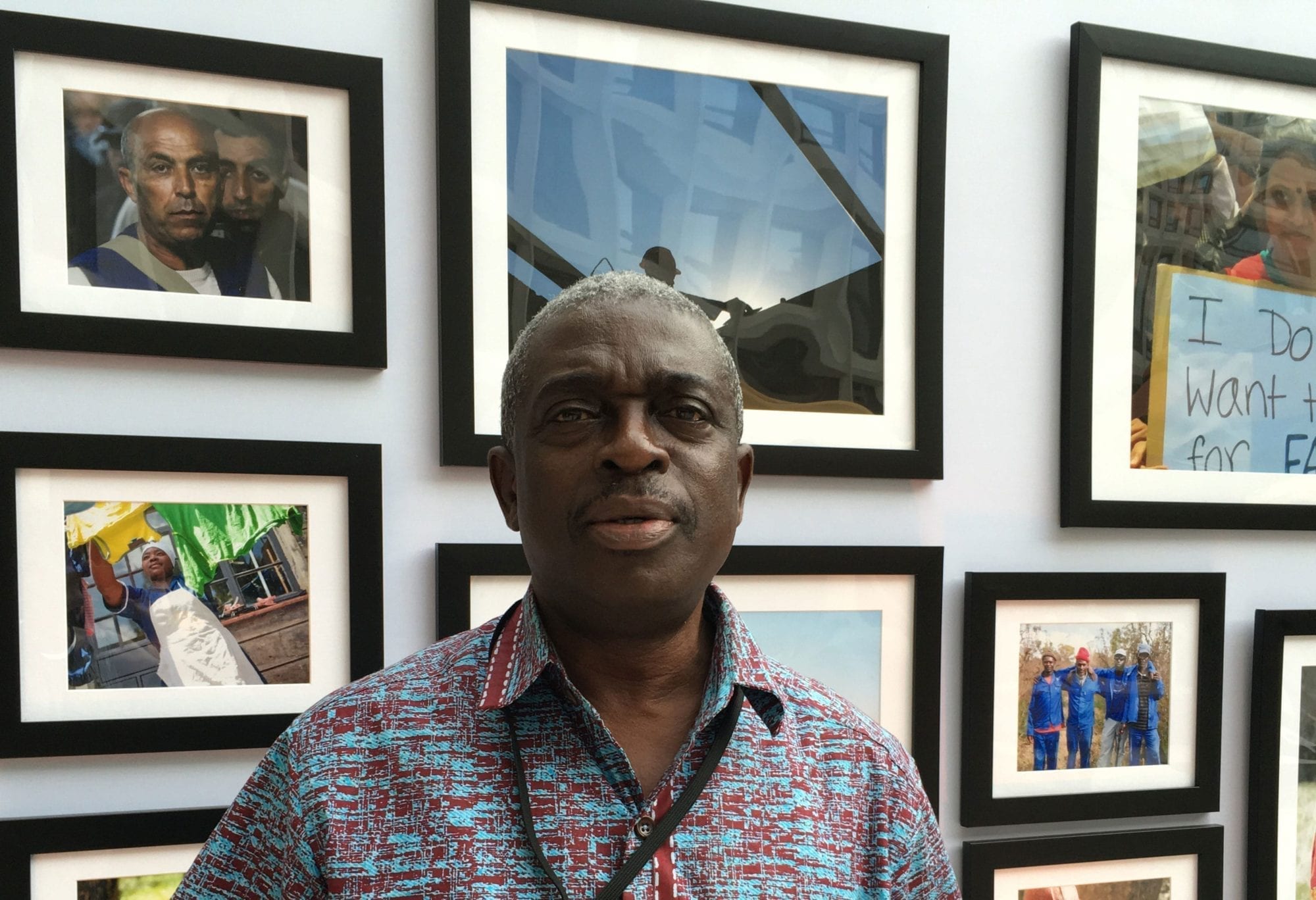
May 31, 2016
Participants at the 2016 Coalition of Black Trade Unionists (CBTU) convention joined the Solidarity Center to celebrate 20 years of working together at a gathering that also launched the first of a year-long series of events marking the Solidarity Center’s 20th anniversary in 2017.
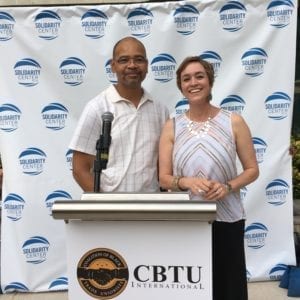
CBTU President Terry Melvin and Solidarity Center Executive Director Shawna Bader-Blau open the 20th anniversary event. Credit: Solidarity Center/Tula Connell
Speaking at the May 27 reception in Washington, D.C., CBTU President Terry Melvin, who serves on the Solidarity Center Board of Directors, said, “The issues affecting workers of color are very similar around the world. I believe there are things we can learn from South Africa, from Europe, that can help us be better trade unionists.”
Opening the event, Solidarity Center Executive Director Shawna Bader-Blau said “We are proud the Solidarity Center has been allied with CBTU in the struggle to achieve worker rights around the globe for the past 20 years.”
In 2014, CBTU met with top African union leaders in high-level meetings organized by the Solidarity Center during the U.S.-Africa Leaders’ Summit in Washington, D.C., and presented recommendations on jobs, gender equality, inclusive economic development and pro-poor investment to African heads of state.
Solidarity Center and CBTU Partners in Brazil
The Solidarity Center and CBTU also have worked in Brazil with INSPIR (the Inter-American Union Institute for Racial Equality) for the past 20 years to help eliminate racism against Afro-descendants in the workplace and throughout society. Afro-descendants comprise more than half the Brazilian population, yet are systematically discriminated against in the labor market.

UAW members Janice Hodges from Ft. Wayne, Indiana, and Melvin Prince from Kansas City, Missouri, were among CBTU members taking part in 20th anniversary celebrations. Credit: Solidarity Center/Tula Connell
Former CBTU president and AFSCME Secretary-Treasurer Emeritus Bill Lucy, who recently retired from the Solidarity Center Board, told participants that after his first fact-finding trip to Brazil with the AFL-CIO 20 years ago, he saw “directly how racial discrimination played out in many ways similarly to what we were fighting (and continue to fight) together against and organizing to overcome in the US.
“The Solidarity Center office in Brazil since then has been a key supporter and funder of this work, which I was proud of then and continue to be glad to see,” he said.
“The Solidarity Center mission is to strengthen workers’ rights around the globe,” said Jos Williams, who recently retired as leader of the Metro Washington Labor Council, and as Solidarity Center Board member. “They did that knowing that one of the best partners they have is CBTU.”
CBTU Members Take Part in International Labor Workshops
Earlier that day, CBTU conference participants attended an international plenary featuring Kwasi Adu-Amankwah, the general secretary of the International Trade Union Confederation Africa Region (ITUC-Africa) and Maria Julia Nogueira, secretary for racial equality at the Central Unica dos Trabalhadores (CUT) in Brazil.
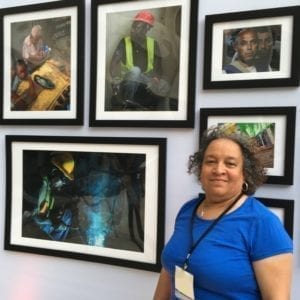
“We are all facing the same struggle”–Lois Carson, a state vice president of the Ohio Association of Public School Employees/AFSCME. Credit: Solidarity Center/Tula Connell
The workshops focused on the struggles African unions and communities are waging against corporate globalization, and on the historic parallels and similar dynamics of racial inequality in the United States and Brazil.
“We are all facing the same struggle,” said Lois Carson, a state vice president of the Ohio Association of Public School Employees/AFSCME, who attended the plenary. “No matter what country, what region, everywhere workers are underpaid, working in bad conditions.”
From Kansas City, Missouri, Melvin Prince, a UAW Local 31 member and CBTU conference participant, put it this way:
“The only way we’re going to get something done is to work together and stick together.”
At the event, the Solidarity Center made available for donation more than one dozen framed photos and posters depicting workers we work with around the world. All donations go to help Solidarity Center’s efforts to help empower workers around the globe.













